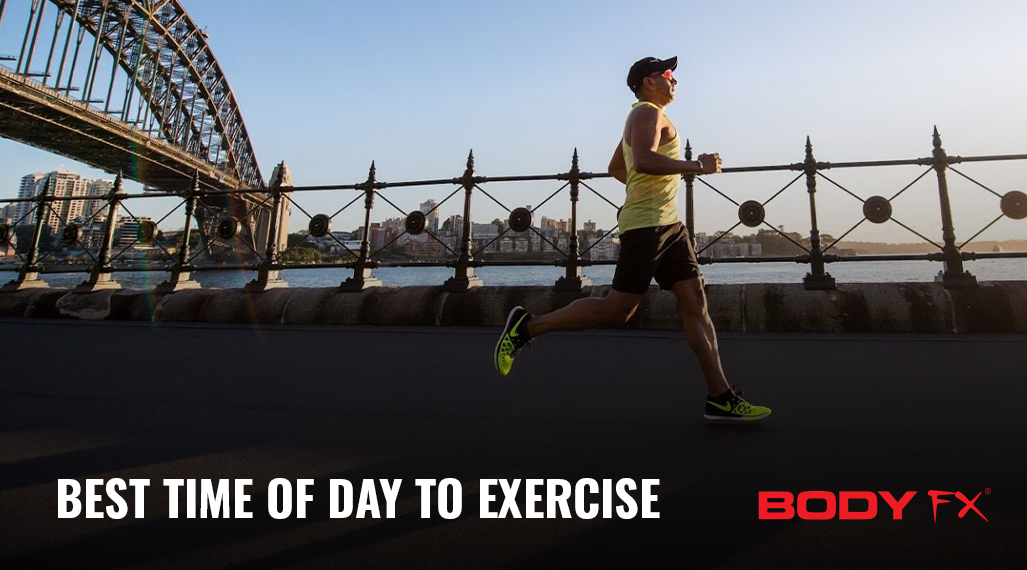Whether you love to exercise or hate it, everyone wants to get the most out of their workouts. We’re constantly trying to come up with more efficient ways to burn fat and build muscle.
If you’re looking to start a workout routine or want to take yours to the next level, you may find yourself wondering about the best time of day to workout. Science shows that there is an optimum time of day to get your sweat on, but it comes with a few caveats.
Perks of Working Out in the Morning
Early birds, rejoice – you’ve got the advantage when it comes to morning workouts! If you’re looking to burn fat and lose weight, working out in the morning, especially if you can do so on an empty stomach, is the best time of day to do so. That’s because your hormones help you to metabolize fat better in the morning due to elevated levels of growth hormone in cortisol, both of which influence your metabolism. The body is more likely to use your fat stores for energy in the morning, particularly when you work out on an empty stomach. Studies show that working out in the morning on an empty stomach can burn up to 20 percent more body fat than working out under different conditions.
If you’re trying to watch what you eat, working out in the morning can also be helpful. A study by Brigham Young University showed that working out for 45 minutes in the morning at a moderate to vigorous intensity can help curb a person’s appetite throughout the day and help them make better food choices throughout the day, which can help you lose weight or at least avoid eating more than you should.
Hitting the gym or going for a run in the morning also helps boost your metabolism throughout the day, which can help burn extra calories. Additionally, one study showed that people who exercise in the morning increase their physical activity throughout the day on days they exercise and have lower levels of activity throughout the day on days they did not exercise in the morning.
Working out in the morning comes with some other advantages, too.
Exercising first thing in the morning can help to provide mental clarity and boost productivity throughout the day and help you feel less stressed and more able to tackle the day’s challenges.
With all of those great benefits, what should you do if you’re not a morning person? The good news is that making the switch to a morning exercise routine isn’t as difficult as it sounds for most people. One study showed that working out in the morning helps your circadian rhythm to shift earlier, helping you to feel more awake in the morning and more tired in the evenings.
If you’re looking to go to sleep earlier, exercising in the morning can be a great way to start.
Yes, those first few days can be painful, but once you establish the habit, you’ll be good to go.
As a little extra motivation, try finding a great exercise video that you love so that all you have to do is roll out of bed and press play. You’ll be working up a sweat before your body even realizes what is happening.
Benefits of Working Out in the Afternoon
If you’re looking to improve your performance and aren’t as focused on losing weight or burning fat, working out in the afternoon might be your best bet. In fact, if you need to do a particularly long or challenging routine, the best time to do it is in the afternoon when your body has received fuel in the form of a meal or two. Eating causes our blood sugar levels to rise, which provides energy in the form of glucose.
Working out at a high intensity or for a long period of time requires lots of blood glucose, so it makes sense that working out at this time would yield peak performance.
Other natural physical processes help prime our bodies for peak performance in the afternoon. Your body temperature is at its highest between 2 p.m. and 6 p.m., indicating that your body is the most ready to perform at a high level. Oxygen uptake kinetics are also faster, which means that your body is better able to conserve resources and use them slowly and effectively when compared to morning workouts.
People who find themselves dragging towards the end of the workday can also benefit from an afternoon workout. Much like morning workouts shift your circadian rhythm forward, working out in the afternoon, particularly between the hours of 1 and 4 p.m., can do the same thing, helping you to feel more energized. Consider taking a late lunch and working out on your lunch break, or even going for a 10-15 minute walk to help get your blood flowing and allow yourself to refocus your energy.
Working out in the afternoon can also help burn more calories than working out in the early morning or evening. One study showed that the body naturally burns about 10 percent more calories in the afternoon when at rest, so it is possible that a similar increase occurs during workouts as well.
Pluses to Working Out in the Evening
No matter what science says about the best time to workout, the reality is that for many people, the time of day when we do our workouts is based on our daily schedules. For many people, the evening is the most convenient time to work out, especially after work.
There is a common misconception that working out in the evening makes it difficult to fall asleep, but so much depends on your body’s internal clock, the type of workout you do, and the intensity at which you exercise. For example, performing a high-intensity workout and then running home to take a quick shower and jump into bed will likely make it more difficult for you to fall asleep quickly.
However, working out in the evening and then going about your normal routine for several hours before bed is less likely to negatively affect your sleep patterns. People who have difficulty winding down at the end of a long day could even benefit from certain low-intensity activities that relieve stress, like taking a walk outside or doing a yoga video.
Working out in the evening might also have benefits for weight loss. Although the link between morning workouts and weight loss is better established, one study found that working out at night does not have a negative impact on sleep patterns and can also help lower levels of a hormone called ghrelin, which impacts hunger levels over time. Lower levels of ghrelin mean that your appetite will be better controlled, which can help with weight loss or weight management.
Conclusion
Looking purely at the scientific evidence, working out in the morning has an advantage over working out at other times of the day. However, a major factor in determining the best time of the day for your workout is your goals.
If you want to lose weight and burn body fat, there is no question that working out in the early morning, especially on an empty stomach, will help you reach your goals faster than working out at other times of the day. However, not everyone who exercises does so to lose weight and burn fat.
If your primary goal is to improve your performance or perform at your peak, an afternoon workout is probably your best bet because your body is primed and ready to workout after several meals.
If you’ve reached the point where you’re hoping to optimize your workouts to achieve your goals as quickly as possible, modifying your workout time may make sense. However, for other people, working out is already something they struggle with.
It can be hard to find the motivation to fit a workout into a busy day, especially if you’re not a morning person and struggle with getting up early. No matter what time of day you choose to workout, the best time of day for your workout is the time of day you feel works best for your body and your schedule. Any workout is better than no workout at all, even if it isn’t done at the “optimum” time to achieve your desired results.








